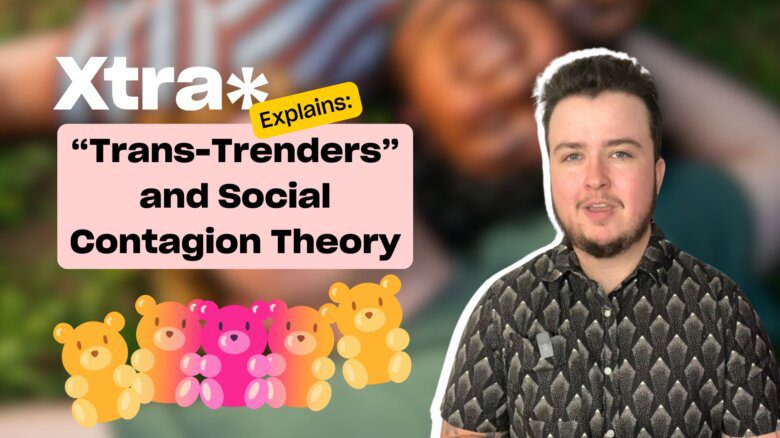In Canadian politics, 2023 was the year that the moral panic around “parental rights” made a comeback in a very big way. New Brunswick started implementing policies in May that would force teachers to report to parents if students wanted to change their name or pronouns at school, even if those students didn’t feel ready to tell their parents. As this spread to Saskatchewan by October, this was clearly distinguished as only relating to names that were gender-identifiable, making it abundantly clear that this policy was about targeting vulnerable trans and gender-diverse students, and that it was being done for cynical political gain.
The use of “parental rights” is not a new concept in Canada, and has been weaponized around queer and trans students in the past. Some of this goes back to at least the 1970s, with Anita Bryant’s “Save Our Children” campaign, which insinuated that the queer community in particular was a threat, and it had further echoes into the 1990s. More recently, it was used both during the fights to reform sexual education to be more inclusive and to have a greater focus on preventing abuse, with absurd notions that this was about indoctrinating five-year-olds with sexually explicit language and encouraging them to engage in anal sex.
Around the same time, these same parental rights concerns were also being engaged as provinces like Alberta, which was under the NDP government of Rachel Notley at the time, were legislating to make it easier for schools to start Gay-Straight Alliance clubs (GSAs). The point of contention was, yet again, whether parents should be notified if their children participated in these clubs. And while Notley ensured that parental notification was not necessary, there were howls that this was infringing upon parental rights. This decision was later overturned when Jason Kenney became premier and he eliminated legal protections for GSAs, allowing schools to notify parents when students join, essentially gutting GSAs across the province because they could not provide safe spaces for students who couldn’t tell their parents they were queer or trans.
And so, like a bad rash, parental rights came around again in 2023 via pronoun policies, in New Brunswick., and Saskatchewan premier Scott Moe took it into overdrive as he immediately legislated the use of the Charter of Rights and Freedoms’ notwithstanding clause at the very first court challenge in order to ensure that his policy would go unchallenged. That challenge will still happen—there will be court cases upcoming that will challenge the validity of the use of the notwithstanding clause under the rubric that it cannot apply in this particular circumstance because of the rights being engaged by school pronoun policies (the clause only applies to a very select number of rights under the Charter, and gender is not one of them). These are still novel arguments before the courts, and it could be a couple of years before this is pronounced upon in any significant way.
It also bears mentioning that while these pronoun policies have only been enacted in two provinces so far, there has been interest in others—Alberta and Ontario in particular, and likely Manitoba, had there not been a change in government this fall. More concerning was the fact that this rhetoric was adopted in broader anti-Trudeau rhetoric, not only from political players like federal Conservative leader Pierre Poilievre, who made the nonsensical accusation that somehow, Justin Trudeau was forcing “radical gender ideology” on students even though education is strictly a provincial responsibility. This was picked up by the far-right actors who are at the centre of the fragmented remains of the so-called “convoy movement” around the country, who have tried to ally themselves with groups like conservative Muslims in order to use this as a wedge against Trudeau and the federal government.
Many of the parents who attended the so-called “1 Million March 4 Children” rallies in September seemed to express this notion that they could somehow stop their children from becoming queer or trans if they were notified. Others used the despicable comparison that this was somehow equivalent to the “government knows best” justification for Indigenous Residential Schools in this country (which was not actually the justification for that national tragedy), or that Trudeau, in expressing support for trans youth, is somehow implicated in grooming children with the mendacious notion of “don’t tell Mommy or Daddy about our little secret.”
The thing with trying to wrap up these anti-queer and anti-trans sentiments in the flag of “parental rights” is that it is done with the deliberate aim to cause confusion among parents who are otherwise sympathetic to queer and trans issues. Nevertheless, the desire for their involvement in every aspect of their children’s lives, even if those children are not ready to tell their parents or who don’t feel safe doing so, is never a consideration. The notion that parents’ rights somehow override the rights of children to autonomy or self-determination is one that really has no legal basis in this country, and yet it’s used as a wedge by bad actors all the time. It also whitewashes the attacks on the rights of vulnerable minorities—and trans youth are some of the most vulnerable in our society—because it allows them to poll on the notion of “parental rights” and get supermajority support, which in turn is used to justify these policies, whether it’s about pronouns or informing parents if their children join a GSA.
Even more insidiously, the unspoken element is that there becomes a parental right to de facto conversion therapy, even if formal conversion therapy is illegal, by informing them that their children are identifying as queer or trans before those kids are ready, and that is entirely intended to keep kids in the closet for longer, even if it causes them irreparable harm (as was stated by the Saskatchewan Court of King’s Bench in the injunction against the pronoun policy before the notwithstanding clause was invoked).
This fight has only just begun, once again. More provinces are likely to test these policies, and more court challenges are on the way throughout 2024. And if we are successful in overturning them, it will only be a matter of time before the cause of “parental rights” gets invoked yet again with the next moral panic, and the one after that.


 Why you can trust Xtra
Why you can trust Xtra


